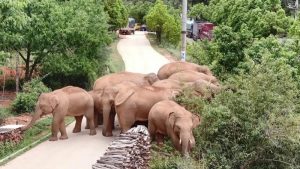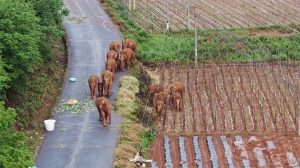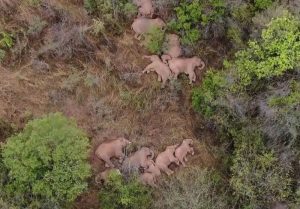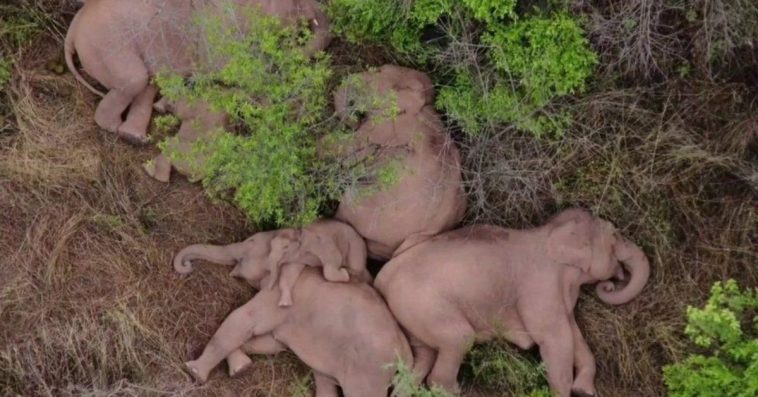China, for more than 15 months, a herd of wild elephants with three calves has been traveling breathtakingly. Scientists have no idea how the 15 elephants managed to travel more than 500 kilometers (300 miles) outside their native environment, a feat that has fascinated China and the entire world.
While it has been exciting, the elephant migration has also sparked worries about how it may affect China’s attempts to conserve animals. Only 300 Asian elephants are still living in all of China, making them an endangered species. One cannot express how important it is to protect the environment and the species.
In this article, we’ll take a closer look at the journey of these wild elephants and the impact it has had on China’s wildlife conservation. We’ll also examine the measures to mitigate human-elephant conflict and the need for balanced coexistence between humans and wildlife.

Photo Credits – Screenshot from YouTube/@GuardianNews
The herd of wild elephants traveled along the main streets of towns like Kunming, which has a population of 6.6 million, and through fields, villages, and even cities. Kunming is home to 6.6 million people.
The elephants caused unexpected devastation across China by consuming crops worth millions of dollars and destroying buildings in populated areas by smashing doors and windows with their trunks.
To keep the elephants and the people they pass on their journey safe, the constant watch has been necessary. The peripatetic herd is being watched by authorities as they move around the third-largest country in the world using a variety of surveillance techniques, including 14 drones and 500 personnel.
The herd’s monitors have been forced to step in, closing the pathways the elephants are traveling on and attempting to lead them back to their natural habitat.
Despite these efforts, the elephants themselves have already decided to backtrack, appearing to be heading back to the Mengyangzi Nature Reserve in Xishuangbanna, in southwest Yunnan province.
A lone adult male elephant has separated from the herd and is currently around 2.5 kilometers away from them, according to the Yunnan Forest Firefighting Brigade.
Why this elephant herd chose to depart from its natural habitat is still a mystery to scientists. Others believe that the elephants may have just decided to relocate to a different habitat.
At the same time, some speculate that it may result from an unskilled leader. Whatever the reason, both the elephants and the people watching it from around the world consider this adventure to be once in a lifetime.
The Elephants’ Habitat And Conservation

Only 300 Asian elephants are still present in China, making them an endangered species. Concerns have been raised about the elephants’ safety as well as the safety of people and their possessions due to their excursion outside of their natural environment.
Their habitat, the Mengyangzi Nature Reserve in Xishuangbanna, in southwest Yunnan province, must be preserved if the species is to be kept from further extinction.
There have been decades of wildlife conservation initiatives in China, yet there are still difficulties. The loss of habitats as a result of human endeavors like agriculture and urbanization is one of the largest problems.
Elephant migration serves as a timely reminder of the value of conserving and protecting wildlife habitats.
To monitor and safeguard the elephants on their journey, the Chinese government has been taking a variety of actions. These actions include directing the elephants back to their habitat, closing roadways, and using drones.

Despite these attempts, the elephants’ travels have nevertheless resulted in unexpected damage, including destroying structures and destroying crops worth millions of dollars. Conflicts between people and elephants have developed.
As a result, underscores the requirement for improved management of human-wildlife interactions.
The journey of the elephants outside of their natural environment has captured the attention of the globe and raised issues regarding animal conservation and interactions between people and wildlife.
For the sake of biodiversity preservation as well as the survival of endangered species like Asian elephants, it is essential to keep protecting and conserving their habitats.
The Impact Of Elephants On Crops And Human Conflict

Crops have suffered substantial damage as the herd of wild elephants travels across China, especially in the regions close to their current location. According to reports, the elephants destroyed farmers’ livelihoods by eating crops worth millions of dollars.
Due to the elephants’ perceived threat to local residents’ way of life, conflicts between the elephants and humans have gotten worse. In addition to destroying crops, elephants have also broken windows and doors in buildings in populous areas. People who live in locations where elephants go have begun to worry about their safety as a result of this.
The neighborhood’s government has implemented several measures of peripatetic herd supervision in order to allay these worries. In an effort to lead the elephants back to their habitat, they have closed the routes that they are traveling on. These initiatives, however, have generally failed.
The conflict between humans and elephants has brought attention to the need for stronger animal conservation initiatives in China. There are currently just 300 Asian elephants left in the nation.
Therefore it’s critical to safeguard their habitat and reduce human-elephant conflict to maintain their survival. These wild elephants’ ongoing travels serve as a reminder of the value of protecting China’s wildlife and natural environments.
The journey of the wild elephant herd across China captured the attention of the entire globe and emphasized the significance of wildlife conservation efforts.
Even though it’s yet unknown why the elephants left their environment, their journey has highlighted the difficulties facing China’s endangered animals and the pressing need for further action to conserve their ecosystems.

The impact of the elephants on agricultural areas and populated areas must be kept to a minimum as they continue their hike. Along with addressing the underlying causes of elephant-human conflict, efforts should be made to lead them back to their habitat and safeguard nearby communities.
More study of elephant behavior and migration patterns is required as a result of the elephants’ journey. This can offer insightful information about the difficulties endangered species face in China and help to guide more efficient conservation efforts.
Overall, the journey of these wild elephants serves as a reminder of the vulnerability of our natural world and the significance of safeguarding it.
Together, we can assure the survival of highly endangered species like Asian elephants and safeguard our planet for future generations.
As we follow the journey of these wild elephants across China, we are reminded of the importance of protecting our planet and its wildlife. What can we do to support wildlife conservation efforts in our own communities?
One simple way to support wildlife conservation is by donating to organizations that work to protect endangered species and their habitats.
You can also take steps to reduce your impact on the environment, such as reducing plastic waste and supporting sustainable practices.
By working together to protect wildlife and their habitats, we can ensure a brighter future for all species on our planet. So, share this article with your family and friends and spread the word about the importance of wildlife conservation. Together, we can make a difference.


